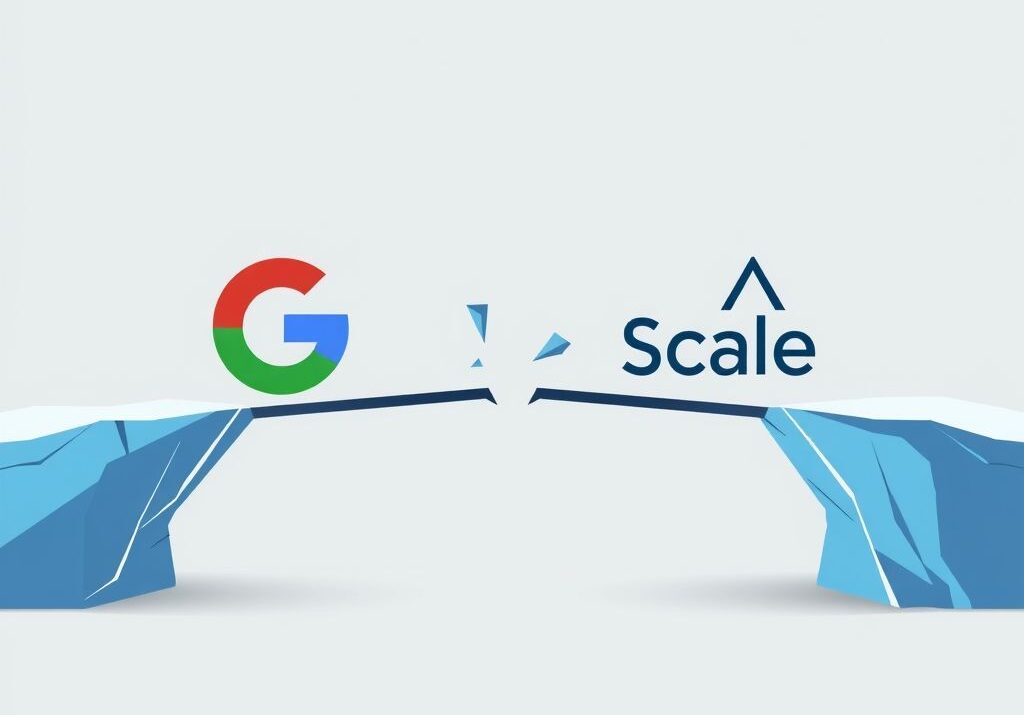Ever feel like a juicy piece of gossip just landed in your lap? That’s how I felt when I stumbled across a report about Google seemingly rethinking its partnership with Scale AI. It looks like Meta’s deep dive into Scale AI’s pockets might be causing some ripples.
According to a recent article on TechCrunch, Google, which planned to drop $200 million on Scale AI’s services this year, is now considering hitting pause. Instead, they’re apparently chatting with Scale AI’s competitors. Now, that’s a plot twist!
Why the sudden change of heart? The article hints that Meta’s hefty investment in Scale AI might be the elephant in the room. It raises a valid question: can Scale AI truly remain impartial when one of its largest backers is a direct competitor to Google?
It’s like trying to referee a football match when you’re wearing the jersey of one of the teams!
And it’s not just a gut feeling. Data shows a growing trend in companies diversifying their AI vendor relationships to mitigate risk. A 2023 report by Gartner predicts that by 2025, 75% of enterprises will use multiple AI vendors to avoid vendor lock-in and ensure best-of-breed solutions. (Source: Gartner Report on AI Vendor Strategy)
This makes Google’s potential move seem less like a knee-jerk reaction and more like a strategic play to maintain control and objectivity in its AI development.
So, what does all this mean? Here are my five takeaways:
- Competition is Fierce: The AI landscape is a battleground, and allegiances shift quickly. Meta’s investment has clearly thrown a wrench into Google’s plans.
- Vendor Neutrality Matters: Companies are prioritizing vendor independence to avoid bias and ensure they’re getting the best possible AI solutions.
- Diversification is Key: Relying on a single AI vendor is a risky move. Spreading the love (and the budget) across multiple providers can help mitigate risk.
- Data is King: High-quality training data is the fuel that powers AI. Google needs to ensure it has access to unbiased and reliable datasets.
- The AI Market is Maturing: We’re moving beyond the hype and into a more strategic phase where companies are carefully evaluating their AI partnerships.
This whole situation highlights the complexities of the AI ecosystem. It’s not just about having the best technology; it’s about navigating the intricate web of partnerships, investments, and potential conflicts of interest.
It makes you wonder, who’s next to rethink their AI strategies? Only time will tell!
FAQ: Google and Scale AI – What’s the Deal?
- What is Scale AI? Scale AI is a company that provides training data for AI systems. They help AI models learn and improve.
- Why was Google working with Scale AI? Google likely used Scale AI to improve the accuracy and performance of their AI models across various products and services.
- Why is Google reportedly cutting ties with Scale AI? The most likely reason is Meta’s significant investment in Scale AI, raising concerns about potential bias or conflicts of interest.
- Who is Meta and what’s their role in this? Meta (formerly Facebook) is a major tech company that is also investing heavily in AI. Their investment in Scale AI is causing some tension.
- What does this mean for Scale AI? Losing Google as a customer could be a significant blow, but Scale AI likely has other clients and will continue to operate.
- What alternatives does Google have? Google can work with other AI data providers or develop its own internal data labeling capabilities.
- Is this a sign that Google is falling behind in AI? Not necessarily. It’s more likely a strategic move to diversify its vendor relationships and maintain control over its AI development.
- Will this affect Google’s AI products? It’s unlikely to have a major impact, as Google can likely find alternative data sources.
- What does this mean for the overall AI industry? It highlights the importance of vendor neutrality and the need for companies to carefully evaluate their AI partnerships.
- Is this news confirmed? The news comes from a report by Reuters, cited by TechCrunch. While not officially confirmed by Google or Scale AI, the report seems credible.







